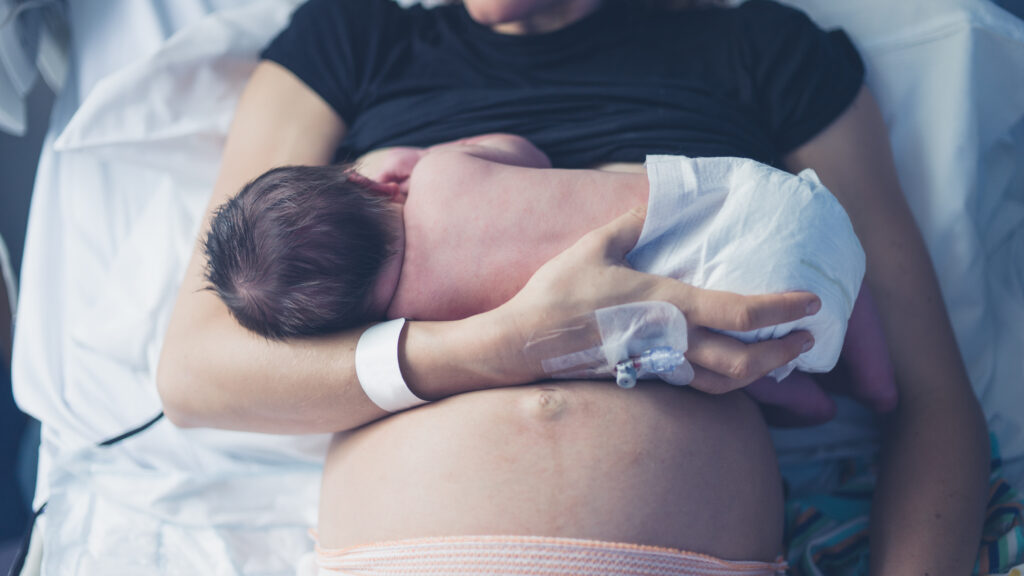Medicaid is an essential source of maternal and postpartum care for low-income Americans, covering 42% of births in the U.S. People who give birth receive maternity care until at least two months after delivery, or longer depending on state or local policies.
But many immigrants don’t have access to this coverage, making them more vulnerable to maternal health problems, as highlighted by a new study of nearly 73,000 postpartum people across 19 states and New York City between 2012 and 2019.
The study, published in Journal of the American Medical Association on Tuesday, quantifies the extent to which restrictive public insurance eligibility policies for immigrants can impact maternal care for low-income people. The study is noteworthy for two reasons: It provides new data about postpartum coverage for immigrants, and shows that restrictive policies are linked to limited maternity care access for all low-income immigrants, irrespective of their documentation status, as well as for non-immigrants.
Overall, nearly half of low-income, noncitizen immigrant women of reproductive age are uninsured in the U.S., compared to 16% of low-income women who are U.S. citizens between the ages of 15 and 44. Medicaid coverage for pregnancy is available to immigrants who are below certain income thresholds (the U.S. median cutoff is below 207% of the poverty line), but only after they have been documented for at least five years. Both undocumented immigrants and recent immigrants who are pregnant are left out of traditional Medicaid coverage.
About half of U.S. states compensate for this Medicaid gap by covering postpartum care for all documented immigrants, waiving the five-year waiting period. And 20 states have some form of public insurance available to cover all income-eligible pregnancies, irrespective of immigration status, though only some of those states extend the coverage to the postpartum period.
That means that even when the pregnancy is covered by public health insurance, low-income immigrant mothers often lose eligibility as soon as they give birth, and may not have the opportunity to access even the initial follow-up visit that is typically scheduled between one and three months after delivery. Yet that is exactly when new mothers face the greatest health risk, as 65% of maternal deaths in the U.S. occur between one day and one year postpartum.
The JAMA study sought to find out just how much of an impact the eligibility options have on whether low-income immigrant mothers are able to access any kind of postpartum care. To do so, the study’s authors divided states into three groups.
The first group (“no coverage”) provided health coverage only to immigrants who had been documented for at least five years. The second group (“moderate coverage”) covered all documented immigrants, even before the five-year waiting period, but not undocumented ones. The third (“full coverage”) covered all immigrants, regardless of status.
The research used data from the states’ Pregnancy Risk Assessment Monitoring System (PRAMS), an ongoing surveillance system that collects information on maternal health, and looked at how the new mothers had answered the survey question, “Since your new baby was born, have you had a postpartum checkup for yourself?” It then compared responses between non-immigrant and immigrant mothers, as well as between immigrant mothers in states with different levels of coverage.
“Compared to immigrants living in states where there were no restrictions based on immigration status on who could be offered public postpartum care, immigrants living in states with restricted public insurance coverage policies were less likely to receive postpartum care,” said Maria Steenland, an assistant professor at Brown University’s Population Studies and Training Center and a lead author of the study.
In states with no coverage for recently documented and undocumented immigrants, 20% of low-income postpartum immigrants didn’t receive any care, compared to 12% of low-income postpartum non-immigrants. But in states where access was granted to all immigrants, the situation reversed, and more low-income immigrants accessed postpartum care (89.5%) than non-immigrants (87.7%).
The study also suggests that lack of coverage for immigrant parents is linked to worse maternal care coverage for non-immigrants, too. In “no coverage” states, access to postpartum services was 4% lower even among non-immigrants compared to “full coverage” states.
“This indicates that these states have other challenges that low-income people are facing,” said Laura Wherry, a study co-author and assistant professor at New York University’s Wagner Graduate School of Public Service.
Lack of postpartum care can have major consequences, as Haywood Brown, a professor of obstetrics and gynecology at the University of South Florida, wrote in the journal Contemporary OB/GYN in 2019. These include “early discontinuation of breastfeeding, undiagnosed postpartum depression and anxiety disorders, lack of family planning and increased recurrence risk for preterm birth (PTB), preeclampsia and gestational diabetes.”
Insufficient postpartum care is also a contributor to racial and ethnic maternal health inequity, according to the government data analysis group MACPAC. Since the majority of low-income immigrants in the U.S. are Hispanic, insurance policy restrictions take the largest toll on that demographic.
The study’s findings suggest restrictive policies exacerbate disparities between U.S.-born mothers and others giving birth in the country. The research also points to policy improvements that could have a significant impact in improving maternal health.
This research is especially important as states re-evaluate their Medicaid eligibility requirements, said Cheasty Anderson, deputy director of the advocacy group Protecting Immigrant Families Coalition. “The JAMA study reinforces what we hear from organizations all over the country — immigrant-inclusive health policies are critical to meeting health care needs,” she said. “Restrictive policies are a threat to the nation’s health, and as postpartum care illustrates, have consequences for the U.S. citizen children and spouses of immigrants too.”


